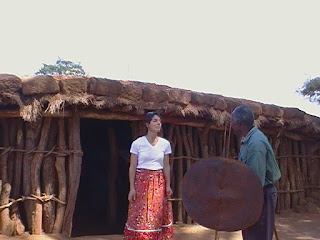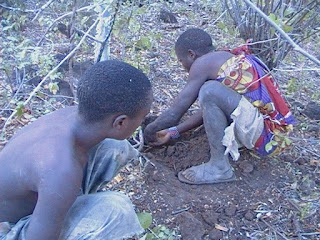

Slept in
Karatu last night, had dinner w/
Donatus and
Loserian. It was nice, they drink Red Bull and gin - I couldn't do it. I went to the the market today with our chef to buy groceries for this evening's dinner at the campsite. Dinner was just like "Out of Africa", the table with the tablecloth, dinner settings, gas lamp and a couple
mosquitos. The food was really delicious, some sort of stew. I would give it high marks anywhere I ate it.
After the market, we visited the
Irako Cultural Center. It was basically a family's home and the dad made a traditional house like the
Irako used to live before the government of Tanzania tore their houses down. It was part of Tanzania's socialist experiment. It was based on the "
ugamaa" (
familyhood) village, an agricultural collective. That didn't work and next came direct state control. 85% of the rural population was relocated into 7000 planned villages in an effort to modernise agriculture and have better access to social services.
The
Iroka built their homes underground so that when the
Maasai came to steal their cattle, they would hear them coming and could grab their spears, which they kept overhead near the door, and defend their cows (which they kept in their houses). So I had a spear throwing lesson as well as grinding millet lesson. The coolest part was that this man took his cow's dung and urine and had these vats underground and turned the waste into gas to power his home, lights and stove. It seems like there's a lot of shit in this world, why is their an energy crisis?


























 Loserian's friend is also a guide and he took us to his uncle's house. The Ta Tonga are herders like the Maasai. I believe they were not always on friendly terms with the each other. Once again, it goes back to the Maasai taking all the cows. It was not considered stealing though, because all the cows in the world belonged to he Maasai, according to their beliefs. A treaty was signed regarding the Maasai and cow stealing. I'm not sure who the other parties were but now all is well and the Maasai are probably one of the most famous and most photographed people in all of Africa. Back to the Ta Tonga. Papa in the picture has 10 wives. Five are here at home with him and the other 5 are out with the cows looking for greener pastures. There was an onion factory and farm built near here, then people came to work and a village grew. However, this resulted in less grazing land so the herders must take their cows wherever there is good grazing. It is their way of life,
Loserian's friend is also a guide and he took us to his uncle's house. The Ta Tonga are herders like the Maasai. I believe they were not always on friendly terms with the each other. Once again, it goes back to the Maasai taking all the cows. It was not considered stealing though, because all the cows in the world belonged to he Maasai, according to their beliefs. A treaty was signed regarding the Maasai and cow stealing. I'm not sure who the other parties were but now all is well and the Maasai are probably one of the most famous and most photographed people in all of Africa. Back to the Ta Tonga. Papa in the picture has 10 wives. Five are here at home with him and the other 5 are out with the cows looking for greener pastures. There was an onion factory and farm built near here, then people came to work and a village grew. However, this resulted in less grazing land so the herders must take their cows wherever there is good grazing. It is their way of life,






